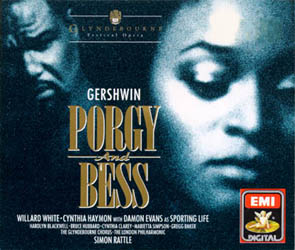IS
IT
A MUSICAL?
OR
IS IT
OPERA? |
 |
Does it :
- unite vocal and orchestral music with
drama?
- express deep, basic human emotions and
depict distinctly human situations?
- have the power of great musical ideas?
- have an overture and musical interludes
between multiple vocal scenes?
- have arias and recitatives?
- have duets and choruses?
- have a substantial visual component, i.e,
large-scale production scenes?
- inspire strong and biased opinions?
Well... then,
Porgy
and Bess
IS opera!
But people weren't always so sure. Of course there were some good
words after its world premiere at Boston's Colonial Theater on
September 30, 1935.
|
"...
a great advance in American opera..." (Serge
Koussevitzky, conductor)
Gershwin "... has traveled a long way from Tin Pan Alley
and must now be accepted as a serious composer..." (Boston
Evening Transcript) |
It then ran for 124 performances
at the Alvin Theater in New York. But many remained dismissive of
the work's impact, some calling it nothing more than "a
hybrid,"
and an "aggrandized musical show," with too many "songs"
instead of arias. Another predicted that of Gershwin's major works,
Porgy and Bess would be "the first to go." The New
York Herald Tribune called the music "...only half alive. Its
gorgeous vitality of rhythm and of instrumental color is impaired
by melodic and harmonic anemia of the most pernicious sort. How trite
and feeble and conventional the tunes...." Virgil Thomson, critic/composer
wrote that he and America's other composers "never could compete
with Gershwin for distribution, nor he with us for intellectual prestige."
But give him credit for belatedly turning around: "Gershwin does
not even know what an opera is... and yet Porgy and Bess is
an opera and it has power and it has vigor."
Unfazed, George Gershwin faced his critics
head-on and with unwavering faith in his opera wrote in the New York
Times:
"I am not ashamed
of writing songs at any time so long as they are good songs. In Porgy
and Bess I realized I was writing an opera for the theater, and
without songs, it could neither be of the theater nor entertaining
from my viewpoint.
But the songs are entirely within the operatic tradition. Many of
the most successful operas of the past have had songs. Nearly all
of Verdi's operas contain what are known as "song hits."
Carmen is almost a collection of song hits...."
Some
more facts about Porgy and Bess:
-
Gershwin originally intended for Porgy
and Bess to premiere at the MET, but the sudden death of
Board Chairman Otto Kahn terminated such plans. It was not until
February 6, 2024 that the curtains rose on Porgy and Bess
at the MET.
-
Will you be my Porgy? Gershwin asked the black opera
singer after he had sung 8 bars of an Italian classic. The baritone
Todd Duncan at first wasn't so sure but he ended up singing
I got Plenty o' Nuttin' all over the world for 40
years!
And for the rest of his life came
to love and revere the great George Gershwin.
- In the '50s, Porgy and Bess toured the Americas and
Europe. The first opera by a native-born American to be staged
at
La
Scala, it also played to great ovation at the Vienna
Volksoper and the Palace of Culture in Leningrad and
for an extended run at London's
Stoll
Theatre. It was this tour that launched the career of
Leontyne
Price, who led the all-black cast.
- In 1976, Houston Grand Opera
staged
Porgy and Bess with the original score and orchestration,
reviving it in 1987 and 1995.
- In 1976, Lorin
Maazel and the Cleveland Orchestra made the first complete
recording of the score.
- In the summer of 1985,
Porgy and Bess was a triumphant success at Glyndebourne
in England.
- The Gershwin estate and the terms of Gershwin's will specify
that English-speaking countries may only produce Porgy and
Bess with all-black casts.
(Click underscored phrases above to buy
or check availability of CD online, OR check
Books & Music) |
Indeed the general public's familiarity with Porgy and Bess
was gained through the many pop renditions (on recordings and
on the commercial theater stage) of its wonderful "song
hits"
But how wrong the naysayers were! Today Gershwin prevails, the
final verdict nicely summed up in a recent Viking's Opera Guide:
... Even
with its minor imperfections and infelicities acknowledged,
Porgy
stands
as the most vital and completely successful of American operas.
One of the great might-have-beens of 20th century music is the
thought of the scores that Gershwin could have gone on to write
if he had lived beyond the age of 38.
Gershwin
himself called Porgy and Bess a folk opera - a folk tale in
which people would naturally sing folk music. The tale is about
a crippled beggar, who roamed the streets of Charleston, South
Carolina in a goat-cart, and his love Bess. It is drawn from
a novel by DuBose Heyward about life and death, hope and despair
in a black community called Catfish Row. From the moment he
set eyes on the novel in 1926, Gershwin knew it was material
for grand opera - his opera. And in the writing of it, which
he began in 1934, he held himself to very high standards:
"If
I am successful it will resemble a combination of the drama
and romance of Carmen and the beauty of Meistersinger."
Did Gershwin
succeed? Opera being opera, the question is certain to ignite
passionate discussion even today. But of course Gershwin succeeded.
If only he had lived long enough to see Porgy and Bess
performed on the same stage as Bizet's and Wagner's works....
-
© GCajipe/FanFaire
(In Background: Clip from the song Summertime, sung by
soprano Harolyn Blackwell.) |
|
